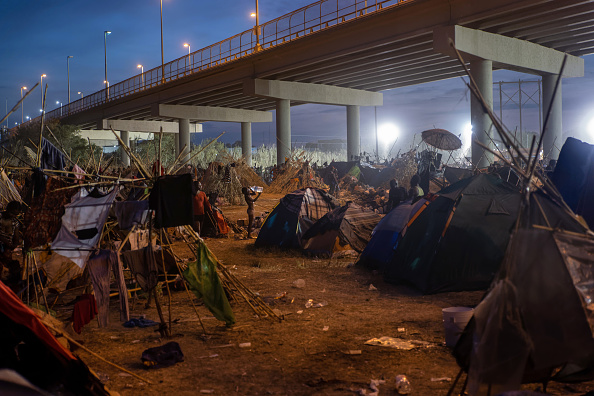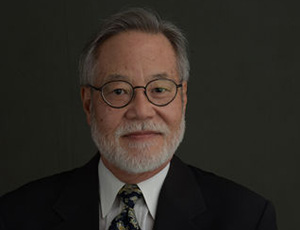Views expressed by any party interviewed by Ideaspace are those of the interviewee and are not necessarily shared by Ideaspace.
 There have been a range of political responses to Florida Governor Ron DeSantis’s decision to fly 50 migrants from Texas to Massachusetts. In an effort to move past these emotionally-charged reactions, Ideaspace sought a legal authority to understand the legal considerations of the DeSantis administration’s actions. We spoke with immigration lawyer Geoffrey Heeren, who has been working in immigration law for decades. He is currently an Associate Professor of Law and the Director of the Immigration Litigation and Appellate Clinic at the University of Idaho. Previously, he founded the Immigration Law Clinic at Valparaiso University and taught at Georgetown Law School as well as the University of Chicago.
There have been a range of political responses to Florida Governor Ron DeSantis’s decision to fly 50 migrants from Texas to Massachusetts. In an effort to move past these emotionally-charged reactions, Ideaspace sought a legal authority to understand the legal considerations of the DeSantis administration’s actions. We spoke with immigration lawyer Geoffrey Heeren, who has been working in immigration law for decades. He is currently an Associate Professor of Law and the Director of the Immigration Litigation and Appellate Clinic at the University of Idaho. Previously, he founded the Immigration Law Clinic at Valparaiso University and taught at Georgetown Law School as well as the University of Chicago.
The following transcript has been lightly edited for clarity.
DW Gibson: I’d like to begin by asking you to tell us what you know regarding the immigration status of the individuals who were transported from Texas to Massachusetts. What do we know about who these individuals are?
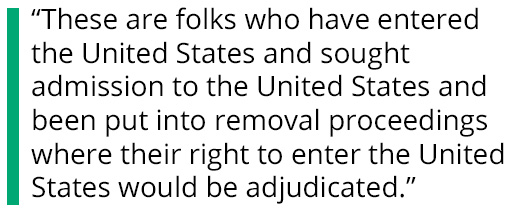 Geoffrey Heeren: I’m not on the ground there but my understanding from the news reports and from looking over the complaint that was filed recently in district court in Massachusetts is that these are folks who have entered the United States and sought admission to the United States and been put into removal proceedings where their right to enter the United States would be adjudicated. And I understand that a number of them are from countries like Venezuela, where it would be common for somebody coming from an environment like that, where there’s lots of violence and in particular political violence, to claim asylum. I would suspect that at least some of the individuals are asylum seekers.
Geoffrey Heeren: I’m not on the ground there but my understanding from the news reports and from looking over the complaint that was filed recently in district court in Massachusetts is that these are folks who have entered the United States and sought admission to the United States and been put into removal proceedings where their right to enter the United States would be adjudicated. And I understand that a number of them are from countries like Venezuela, where it would be common for somebody coming from an environment like that, where there’s lots of violence and in particular political violence, to claim asylum. I would suspect that at least some of the individuals are asylum seekers.
DW Gibson: As you read reports and hear news about what’s been developing over the last few days, I wonder what stands out to you about what we’re witnessing? Is there something, in legal terms or otherwise, that has been lost and is not getting enough attention in our public discourse?
Geoffrey Heeren: So I guess related to my last point, I would want to stress that it’s not accurate to just refer to the class of persons involved as so-called “illegal aliens,” as some do, or even as undocumented immigrants, because a number of them, I believe, are seeking forms of relief that they’re entitled to seek under U.S. immigration law, like asylum, and they’re in an immigration process that allows them to seek those benefits. Typically the way that would work is that they would have court appearances. My understanding is that these are persons who were in Texas and they would’ve been appearing before an immigration court in Texas. So it’s potentially disruptive to their cases to move them to a different location. At a minimum, they would need to seek to transfer venue, and it is not a given that that would occur.
 It’s my understanding that change-of-address forms were filed with USCIS in some of the cases, but USCIS is not even the agency that administers the immigration court. USCIS, or U.S. Citizenship and Immigration Services, is part of an enormous immigration bureaucracy that adjudicates certain immigration applications, but does not preside over the immigration courts, which are actually part of the Department of Justice. So I do think it’s potentially disruptive to their cases to just up and move them to a different place.
It’s my understanding that change-of-address forms were filed with USCIS in some of the cases, but USCIS is not even the agency that administers the immigration court. USCIS, or U.S. Citizenship and Immigration Services, is part of an enormous immigration bureaucracy that adjudicates certain immigration applications, but does not preside over the immigration courts, which are actually part of the Department of Justice. So I do think it’s potentially disruptive to their cases to just up and move them to a different place.
And then this gets really to the heart of the issue, which is that we don’t live in a country with 50 different immigration policies. We live in a country with a federal government that has plenary power over immigration, that has the ability to make immigration policy. When states undermine that ability in different ways, typically the Supreme Court has found that to be unconstitutional and to be preempted by federal immigration laws.
 So that’s one of a variety of legal issues that I think are implicated here: whether the state’s efforts, whether Florida’s effort, Texas’s effort to just move immigrants out of state to other locations, is running afoul of the supremacy clause and the notion that the federal government has exclusive power over immigration.
So that’s one of a variety of legal issues that I think are implicated here: whether the state’s efforts, whether Florida’s effort, Texas’s effort to just move immigrants out of state to other locations, is running afoul of the supremacy clause and the notion that the federal government has exclusive power over immigration.
So that’s two aspects. One being that this is not just a population of so-called illegal aliens, and I don’t use that term, but this is a population of people who are in immigration court, who are seeking to have their rights adjudicated. And secondly, that the state’s efforts in this regard are potentially in conflict with the federal government’s power over the topic of immigration.
DW Gibson: On that second point, if someone were to call out that point, in legal terms, would that need to be the Department of Justice?
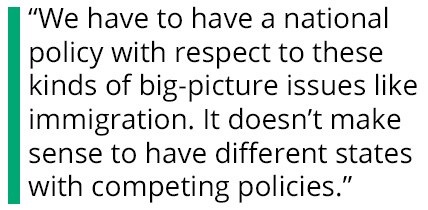 Geoffrey Heeren: It’s an interesting question. I do think that the complaint that was filed does raise a claim under the supremacy clause, and the plaintiffs are not the federal government. The plaintiffs are a nonprofit and a class of non-citizens who were moved. So typically the federal government is in the best position to assert its rights concerning preemption. But I do believe it could be raised by other parties as well, potentially.
Geoffrey Heeren: It’s an interesting question. I do think that the complaint that was filed does raise a claim under the supremacy clause, and the plaintiffs are not the federal government. The plaintiffs are a nonprofit and a class of non-citizens who were moved. So typically the federal government is in the best position to assert its rights concerning preemption. But I do believe it could be raised by other parties as well, potentially.
DW Gibson: You’ve talked about the federal government asserting its authority in this regard in the past. Are there historic parallels that jump out to you either from long ago, centuries ago or decades ago, that echo the current situation, precisely in terms of this tension between states and federal government and efforts to transport people, perhaps against their will?
Geoffrey Heeren: I think there are a lot of historic parallels. One that jumps to mind is the effort of California during the Dust Bowl to keep out Okies. That resulted in a Supreme Court case called Edwards v. California, and the Supreme Court found that California’s effort to criminally prosecute people who were bringing Okies into the state violated the right to travel. So here we’re dealing with a different population. We’re not dealing with a population of interstate migrants, migrating in response to economic conditions and agricultural conditions. We’re dealing with a population of immigrants but, big picture, we’re looking at the same issue, which is: Do states have the ability to keep people out who they don’t want? That’s a theme that you can go back pretty far and find in different forms throughout U.S. history. And typically the Supreme Court’s answer has been “no.” Part of the reason is the individual constitutional rights that are at stake, potentially, like the right to travel, but also the right to equal protection or due process.
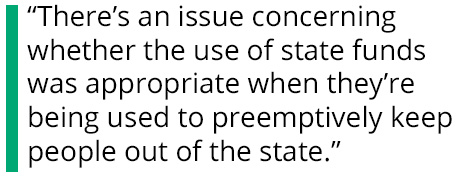 Another issue is, again, we have to have a national policy with respect to these kinds of big-picture issues like immigration. It doesn’t make sense to have different states with competing policies.
Another issue is, again, we have to have a national policy with respect to these kinds of big-picture issues like immigration. It doesn’t make sense to have different states with competing policies.
DW Gibson: Governor DeSantis gave a press conference, and he was explaining that the reason he did this was preemptive, that he had quote “intelligence” that a lot of the migrants who were in Texas preferred to travel to Florida in the long run. And so he was trying to preempt that action. It sounds like that just makes what you’ve already described as a tenuous decision even more tenuous because of its preemptive nature.
Geoffrey Heeren: Yes. It’s my understanding that he was using Florida state funds for that purpose, some of which may have been through Federal Coronavirus Relief Funds. And it’s my understanding that in the lawsuit that was filed, there’s an allegation that that violates federal non-discrimination provisions related to the receipt of federal funds. And so I think there’s an issue concerning whether the use of state funds was appropriate when they’re being used to, as you said, preemptively keep people out of the state that aren’t even in the state based on hearsay and essentially speculation about whether they might eventually end up in the state of Florida.
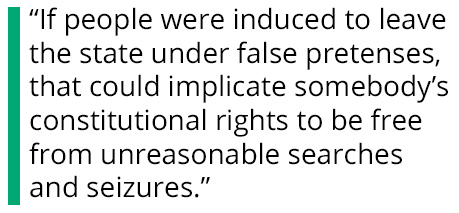 I agree with your description that this position is tenuous. It seems tenuous. Governor Abbott’s actions that he’s taken can also be criticized and are being criticized, I think, in a variety of ways but I think there’s additional reasons to criticize the actions of Governor DeSantis when there were not even persons in the state of Florida who are being moved, using funds [for which] the state is ultimately responsible to the taxpayers of the state and the federal government.
I agree with your description that this position is tenuous. It seems tenuous. Governor Abbott’s actions that he’s taken can also be criticized and are being criticized, I think, in a variety of ways but I think there’s additional reasons to criticize the actions of Governor DeSantis when there were not even persons in the state of Florida who are being moved, using funds [for which] the state is ultimately responsible to the taxpayers of the state and the federal government.
DW Gibson: So there is the issue of federal power versus state authority. Then you can dial down into the nitty gritty of some of the stories we’re getting, particularly in that class action lawsuit that was filed. We know that at least some of the people who were transported were in a shelter in Texas run by a nonprofit, and they allege in the court filing that they were told false information to get them out of their shelter and onto the plane. If such allegations are true, what does that introduce in terms of legal liabilities for Governor DeSantis and other officials involved in the operation?
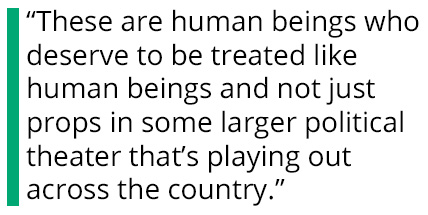 Geoffrey Heeren: In legal terms, that introduces issues under the fourth amendment, issues under state tort law, for state tort claims like false imprisonment, fraud and deceit, but also constitutional questions too. If people were induced to leave the state under false pretenses, that could implicate somebody’s constitutional rights to be free from unreasonable searches and seizures. It introduces potentially other claims for even immigration benefits that the people who are relocated might lay claim to. For example, there’s a visa that exists for victims of certain types of crimes, one of which would be crimes along the lines of kidnapping or abduction or unlawful restraint. So if those types of allegations were true, that could potentially give rise to claims for immigration benefits on behalf of people who were moved under false pretenses.
Geoffrey Heeren: In legal terms, that introduces issues under the fourth amendment, issues under state tort law, for state tort claims like false imprisonment, fraud and deceit, but also constitutional questions too. If people were induced to leave the state under false pretenses, that could implicate somebody’s constitutional rights to be free from unreasonable searches and seizures. It introduces potentially other claims for even immigration benefits that the people who are relocated might lay claim to. For example, there’s a visa that exists for victims of certain types of crimes, one of which would be crimes along the lines of kidnapping or abduction or unlawful restraint. So if those types of allegations were true, that could potentially give rise to claims for immigration benefits on behalf of people who were moved under false pretenses.
DW Gibson: Are there other important parts of this story that you feel deserve more emphasis and scrutiny?
Geoffrey Heeren: Related to the first point I made about how this is not just a population of so-called illegal aliens, as some might say, but this is a population of people who are having their rights adjudicated, I also want to say that these are human beings who deserve to be treated like human beings and not just props in some larger political theater that’s playing out across the country. It reflects the sad state of affairs right now, concerning rhetoric about immigration, that this seems like a ploy to shift immigrants from one state to another to try to make a political point. I think that that’s really sad. I think that it’s a sad state of affairs for the people involved and a sad state of affairs for our country.
DW Gibson: One final question I have for you that’s a little bit more political, but speaks to the point you were just making: Is this a tendency to use immigration writ large — and human beings — as political tools to rile up voters? It’d be great to hear you speak to that and not just in contemporaneous terms, but in historic terms. It seems like it’s a recurring theme that gets called upon again and again throughout history, no?
 Geoffrey Heeren: It absolutely is. You actually can go all the way back to the nation’s founding at which point it wasn’t non-citizens from places like Venezuela who were the targets of political attacks, but it was German and Irish people. You can see it in comments from Benjamin Franklin, and moving into the 19th century, there was a movement that started to gain strength in the mid-19th century called the Know Nothing Movement where, again, there were these same types of dynamics where oftentimes you had states arguing that there needed to be reforms in light of a so-called invasion of immigrants.
Geoffrey Heeren: It absolutely is. You actually can go all the way back to the nation’s founding at which point it wasn’t non-citizens from places like Venezuela who were the targets of political attacks, but it was German and Irish people. You can see it in comments from Benjamin Franklin, and moving into the 19th century, there was a movement that started to gain strength in the mid-19th century called the Know Nothing Movement where, again, there were these same types of dynamics where oftentimes you had states arguing that there needed to be reforms in light of a so-called invasion of immigrants.
We see that in the era of Chinese exclusion in the late 19th century and the Chinese Exclusion Act that was passed in the 1880s. And we lived with that racist history of Chinese exclusion up until the mid-20th century. And there do seem to be periodic cycles of anti-immigrant sentiment, oftentimes exploited by certain types of political actors. And it’s probably not something that’s going to go away, but I think that this latest episode is one that is going to stand out even in the history books as being particularly flagrant.
Read More:
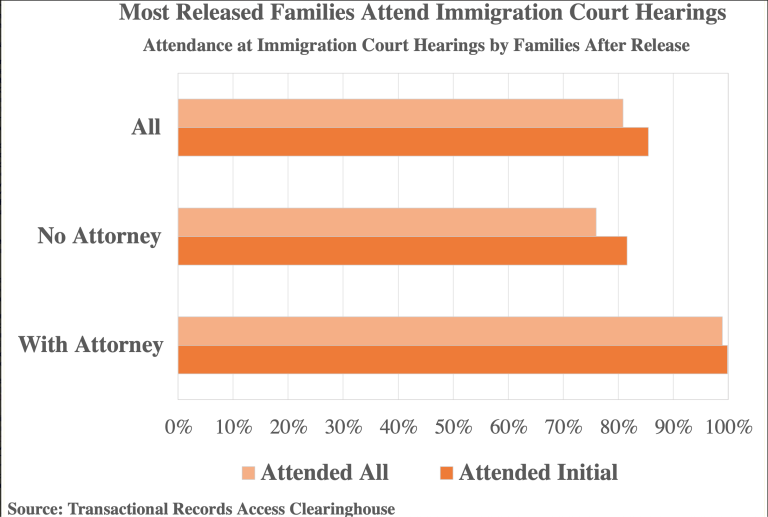
Congressional Note No. 2

